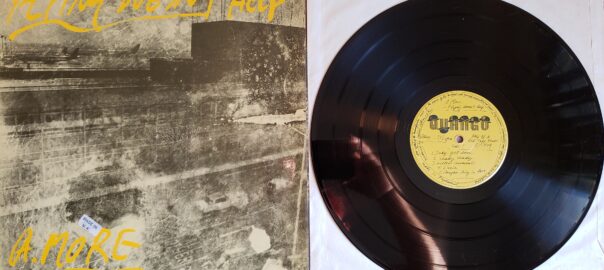I started this project near the time I started my blog, but … I didn’t get very far with it. The intention was to revisit albums I own that are old, or obscure, or need more exposure — or maybe just to remind myself how good they actually are. It is a fair assumption that any album that appears here is one that I think has some merit, and who knows? Maybe someone reading these will find a new favourite.
This is the fourth album in the series. The others are here, here, and here. I hope you will check them out.
Flying Doesn’t Help
Released 1979
Personnel:
- Anthony Moore: Lyrics*, lead and backing vocals, keyboards, guitars and electronics
- Bob Shilling, Chris Slade, Robert Vogel, Charles Hepworth: Drums
- Festus, Sam Harley, Matt Irving: Bass
- Laurie Latham: Sax and mouthharp, backing vocals
- Edwin Cross: Backing vocals
*Lyrics to “War” by Peter Blegvad
Tracklist:
- Judy Get Down
- Ready Ready
- Useless Moments
- Lucia
- Caught Being in Love
- Timeless Strange
- Girl It’s Your Time
- War
- Just Us
- Twilight (Uxbridge Rd)
Anthony Moore (his surname sometimes appears as More) is a British experimental composer and producer, although he has spent most of his career based out of Germany. He along with his school friend Peter Blegvad were briefly members of the British experimental avant-garde collective Henry Cow, but they soon left and in 1971 formed the avant-pop trio Slapp Happy, along with Dagmar Krause. Slapp Happy released several albums, a couple in collaboration with Henry Cow, but their eccentric and minimalist style, along with the fact that they refused to play live, caused the record labels to largely avoid them.
By 1977 Anthony Moore had returned to a solo career (he had recorded a couple of minimalist solo albums in the early 1970s); over the decades he has worked with Pink Floyd, Richard Wright, Kevin Ayers, Trevor Rabin, and Julian Lennon, and released a few more albums of his own.
Flying Doesn’t Help is a very curious album. First, the original release contains almost no information. The album’s front cover has the title and “A. More” scribbled on it, and the back cover has a scribbled track list. There are no credits, no lyric sheet, nothing else at all: even the label information is a handwritten scrawl. The record looks as if the submission deadline was half-an-hour away and that cover was the best they could come up with. (In 1994 the album was re-released as a CD along with Moore’s next album, World Service, and this does contain performer credits).
Then there is the music. The album has 10 tracks, relatively short, poppy songs that on first listen sound rather conventional, but there is a lot going on. Moore has a sophisticated grasp of minimalist and avant approaches, and he makes heavy use of synthesizers, sampling, and electronics. It is an album that is both of its time, and ahead of its time: it anticipates post-pop, post-punk, and new wave, genres a few years in the future. It manages to sound like the 1980s before the 80s came along.
The album begins with “Judy Get Down”, pleasant melodic synthpop, but beneath (and a feature of all the tracks) is a jittery sense of unease: strange electronic noises flutter and swirl behind the melody and vocals; darkly atmospheric bridges link the tracks together.
“War/Just Us” probably the highlight of the album — “War” was co-written with Peter Blegvad and was first performed by Henry Cow on their 1975 album In Praise of Learning, as a jagged experimental avant-jazz piece. Moore has completely revamped it into a heavy relentless electronic stomp-fest that bears almost no resemblance to the original version, about as close to rock’n’roll as Moore ever got. “War” slides via electronic/programmed bridge into an angry heavily-sampled track called “Just Us” with a catchy angry chorus. The album ends with “Twilight, Uxbridge Rd.”, an atmospheric wash of synthesizer noodling and strange electronic wails.
Flying Doesn’t Help has always been one of my favourite albums. It is over 40 years old now, and yet it still sounds fresh; its idiosyncratic style helped it to evade the musical tropes and stereotypes of the era. It really doesn’t sound like anything else.
